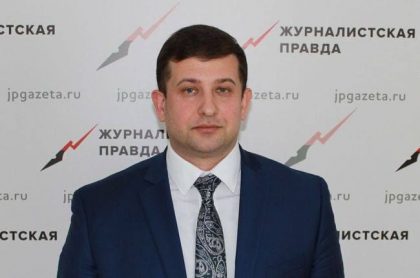The Russian media outlet Izvestia reported about a document, authored by Andrey Manoilo, a member of the member of the scientific advisory board to the Russian Security Council, on the U.S. interference in Russia's 1996-2018 presidential campaigns. According to Manoilo's report, the U.S. has stepped up its attempts to meddle in Russia's internal affairs since Vladimir Putin came to power. "That is, precisely at the time when Russia started to 'make itself felt as an independent player on the global stage, aspiring to sovereignty in domestic political questions'," states the report. The report also specifies that the chief purpose of Washington's interference is discrediting Russia's leadership, Putin and his inner circle.
Below are excerpts from the Izvestia article:[1]

Andrey Maniolo (Source: Jpgazeta.ru)
'The Chief Purpose Of [The U.S.] Interference Is Discrediting [Russia's] Leadership'
"The U.S. is viewing the presidential election on 18 March as an 'historic opportunity' for pressuring Russia, and is preparing a large-scale intervention in the electoral process. Washington is planning to use a wide range of tools, including disinformation, psychological operations and financing the opposition. The chief purpose of these actions is delegitimizing the electoral process in Russia. This is the essence of the report 'Intervention. U.S. Interference In The Elections In The Russian Federation During The 1996-2018 Presidential Campaigns' that came to the attention of Izvestia. The report's author, Andrey Manoilo, a member of the scientific advisory board to the Russian Security Council, told us about specific mechanisms that will be used by the US during the presidential election in Russia.
"Washington has already tested various methods of influencing the results of Russian presidential election campaigns in 1996, 2000, 2004, 2008 and 2012. Andrey Manoilo's report states that the U.S. is getting ready to do the same in the head of state election that is to take place in Russia on March 18. According to this document, the U.S. has a broad network of governmental and non-governmental actors influencing political processes in other countries. Additionally, the current U.S. national security strategy explicitly declares Russia and China to be some of the most dangerous states on the global stage, placing Moscow on a par with international terrorist organizations and 'rogue states (such as Iran and North Korea). In the political analyst's opinion, Moscow should get ready to counter the attempts to influence the presidential election.
"The document also states that the U.S. has stepped up its attempts to interfere in the internal affairs of Russia since Vladimir Putin came to power. That is, precisely at the time when Russia started to 'make itself felt as an independent player on the global stage, asserting sovereignty in domestic political questions.'
" U.S. official circles perceive this as a threat to their global hegemony. Informational and economic influence on Russia both on the internal and external level becomes a significant task for Washington in order to ensure its own global leadership and strategic dominance', the report states.
"One of the ways in which the U.S. interferes in the internal affairs of Russia is information warfare, which is essentially psychological pressure on broad masses of the population, Andrey Manoilo emphasized in his talk with Izvestia.
"— The chief purpose of this interference is discrediting the country's leadership, the president and his inner circle. The U.S. actively uses these methods of influence. A target of influence is selected and studied in detail. After that, massive and organized disinformation is spread via mass media, social networks, agents, etc., explains the author of the report.
"The expert is sure that the U.S. and other Western countries are actively working with the Russian opposition. As an example, he cites [presidential candidate and leader of the opposition Yabloko Party] Grigory Yavlinsky's visits to the British embassy in Moscow and the trip by presidential candidate Ksenia Sobchak to the U.S., where, by his assumption, they could have transferred certain financial resources to her.
"— The Russian opposition never concealed the fact that it had close ties with various Western countries, including U.S. government entities. In addition, American instructors are engaged in the election campaigns of opposition candidates, [and] that also constitutes a form of interference in the electoral process, notes Andrey Manoilo.
"Among the examples of U.S. interference, the report cites the 2012 election campaign in Russia. The following strategies of influence are identified in the document:
"— A focus on online communication (VKontakte, Facebook, Twitter) and, as a consequence, influencing the inhabitants of large cities and the young;
"— Reliance on popular opposition leaders (Alexey Navalny, Ilya Yashin);
"— Counting on the spontaneity of protests and their radicalization;
"—Definition transfer: directing the population's everyday problems connected to the social sphere, health-care and education, into political and ideological discourse;
"— Exploiting global media resources (CNN, Fox News, BBC, Voice of America, Radio Liberty) to instill in the protesters a feeling of unity with the entire 'democratic world'.
"The First Deputy Chairman of the Federation Council's International Affairs Committee, Vladimir Djabarov, emphasized in his talk with Izvestia that a system-wide interference of the U.S. in Russian internal affairs has always existed, but today the RF is a strong and cohesive society, ready to combat foreign influence on all levels. According to the senator, there will be attempts at intervention, but Moscow has already taken all necessary steps and is ready to counter all illegal actions by foreign states. Moreover, the parliament member noted that attempts to influence the elections in Russia will be publicized on all international platforms and demonstrated to the world community."
[1] "American 'Intervention'", Yuri Bogdanov, Iz.ru, February 21, 2018.





